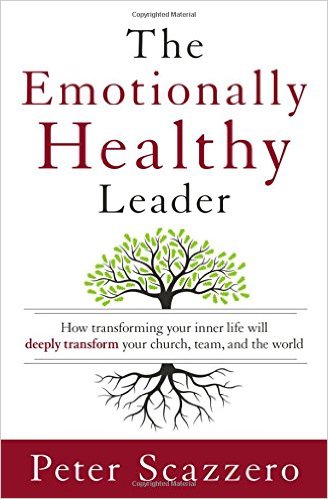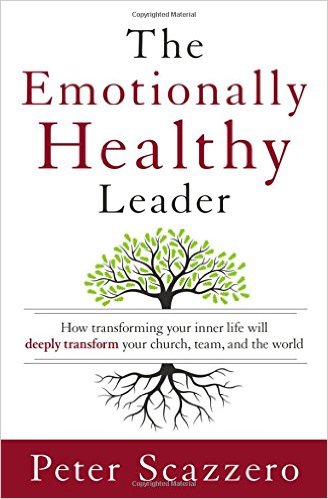The Emotionally Healthy Leader

A Denver Journal Book Review by Denver Seminary Senior Professor of Christian Formation Bruce Demarest

Peter Scazzero, The Emotionally Healthy Leader. Grand Rapids, MI: Zondervan, 2015. 328 pp. Hardback, $22.99. ISBN: 978-0-310-49457-7.
Scazzero is the founding pastor of New Life Fellowship Church in Queens, New York, a congregation gathered from more than seventy countries. He is the author of bestselling books such as Emotionally Healthy Spirituality and The Emotionally Healthy Church. The focus of this his most recent publication and the mission of the Emotionally Healthy Spirituality (EHS) emphasis is to empower the church with a deep, beneath-the-surface spirituality that transforms people who transform the world.
Scazzero’s personal and pastoral transformation is reflected in four decisive conversions, each of which turned his life in a radically new direction. Raised a nominal Italian Catholic, his first conversion was “From Agnosticism to Zealous Christian leader” (p. 12). After establishing New Life Fellowship Church and later experiencing ministry disappointments and personal burnout in which he hit rock bottom, Scazzero underwent a second conversion described as “From Emotional Blindness to Emotional Health” (p. 14). Taking a four month sabbatical with his wife, Geri, to explore biblical and classical spirituality, he describes his third conversion as “From Busy Activity to Slowed-Down Spirituality” (p. 17). Adopting a more contemplative lifestyle, life in this season flourished and ministry blossomed. Living into the reality of a more healthy emotional and spiritual state, Scazzero describes his fourth conversion as, “From Skimming to Integrity in Leadership” (p. 18).
The book unfolds in two parts: the first dealing with the inner life and the second with the outer life. Part one explores four fundamental tasks of the inner life which every committed follower of Jesus must undertake: namely, “facing one’s shadow, leading out of marriage or singleness, slowing down for loving union, and practicing Sabbath delight” (p. 23). But first Scazzero identifies as counterpoints four characteristics of unhealthy leaders: (1) they possess low Self-awareness; (2) they prioritize ministry over marriage or singleness; (3) they are busier for God than their relationship with God can sustain; and (4) they are deficient in the all-important work/Sabbath rhythm. Scazzero employs the imagery of a Manhattan skyscraper to illustrate point three of an unhealthy spiritual leader. In order to bear the weight of a 75 or 100 story building, workers must drive concrete or steel piles deep into the granite bedrock. Analogously, to sustain a fruitful spiritual life and enduring ministry, the disciple must cultivate a sturdy, spiritual foundation.
Back to Scazzero’s four core tasks of the inner life. The first, facing one’s shadow “requires confronting parts of who we are that we prefer to neglect, forget, or deny” (p. 51). The shadow may include drivenness, defensiveness, perfectionism, need for affirmation, bitterness, lust, etc. Ignoring one’s shadow consigns a person to a spiritually and emotionally stunted life. Scazzero cites several helpful strategies to confront and tame the destructive shadow, including employing a genogram to explore the dynamics of one’s family history. The second task is to lead out of one’s marriage or singleness. Too many Christian leaders prioritize ministry over marriage and family or the vocation of singleness. Scazzero argues that passion, broadly speaking, generated within the marriage relationship is intended to overflow and empower kingdom ministry. In the case of singleness, spiritual passion that flows from weddedness to Christ, the heavenly bridegroom, energizes service to a needy world.
The third task of the inner life is to slow down the pace of life in order to cultivate loving union with God. Relentless speed and cold efficiency characterizes life in the city of mammon. Scazzero rightly insists that loving relationship with God cannot be programmed or rushed. To foster deep communion with the Lover of our souls, one must carve out space each day to practice silence, solitude, waiting on God, and biblical meditation. Rushing through life at warp speed only warps the soul. Christ followers desperately need to achieve a “desert” experience with God. Scazzero is particularly passionate about the fourth task of the inner life, namely, the practice Sabbath delight. “Sabbath rest is a twenty-four hour block of time in which we stop work, enjoy rest, practice delight, and contemplate God” (p. 144). Tragically, too many Christians and leaders fail to exchange work performance for Sabbath rest, fearful of the painful, personal stuff they will confront within. Others are wary of adopting a legalistic lifestyle. The reality is that “God’s Sabbath rhythm is a reflection of the rhythm that undergirds all of creation,” and so must be observed for our authentic well-being (p. 145).
Part two of the book builds on the foundation of a healthy spiritual and emotional inner world to explore four fundamental outer life tasks, namely, “planning and decision making, culture and team building, power and wise boundaries, [and] endings and new beginnings” (p. 23). The first ministry task includes creating space for heart preparation and so defining success as radically doing God’s will. The second includes work and personal formation as two sides of the same coin including emphasis on the quality of the servant’s marriage. The third concerns how to wisely manage power and authority and to honor boundaries in dual relationships, for example a lead pastor being a close friend of a staff member. Finally, the fourth outer life task deals with the complexities of endings and new beginnings in the lives and ministries of paid and volunteer staff.
The book includes many helpful vignettes of persons who either failed or flourished in life and ministry dependent on their spiritual maturity. Each chapter includes sample questions and scoring mechanisms useful for evaluating how well the reader applies given principles and practices to his or her life and ministry. In sum, The Emotionally Healthy Leader digs deeply and fruitfully into the nook and crannies of spiritual life and ministry. It reflects thoughtful engagement with the life giving resources of the spiritual formation movement, including prayer, solitude, Rule of Life, Sabbath keeping, contemplative spirituality, the Daily Office, as well as emotional health and application thereof to a variety of ministry situations. Here is a work with unlimited potential to change for the better how we live and serve.
Bruce Demarest, Ph.D
Senior Professor of Christian Formation
Denver Seminary
November, 2015
